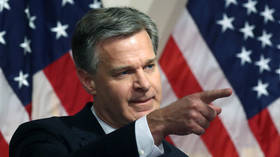Under Biden, expect more bombing and regime change. Tony Blinken’s record speaks for itself

A US foreign policy run by Antony J. Blinken and Jake Sullivan, the likely next secretary of state and national security adviser, will mean more global interventions and regime-change operations, Clinton and Obama style.
Blinken played a prominent foreign policy role in both the Bill Clinton and Barack Obama administrations, while Sullivan was part of the Obama one.
The Democrat-boosting media are, not surprisingly, excited by media-anointed President-elect Joe Biden’s choice of Blinken, his long-time national security adviser, as his secretary of state. Along with his pick of Jake Sullivan, another close aide, as his national security adviser, these appointments supposedly signal restoration of “internationalism” and “globalpartnerships” as guiding principles of US foreign policy.
Also on rt.com US foreign policy elite wants Biden & detests Trump because President failed to launch new NATO missions to justify its existenceMedia fawns for fake ‘internationalism’
Blinken, a “defender of global alliances,” in the soothing words of the New York Times, will “help calm American diplomats and global leaders alike after four years of the Trump administration’s ricocheting strategies and nationalist swaggering.” To the Washington Post, Blinken’s appointment would be fulfillment of Biden’s “vows to reassemble global alliances and insert the United States into a more prominent position on the world stage.” The Guardian purred that the appointees are:
“...committed internationalists, in strong contrast to the Trump era, which saw a bonfire of foreign treaties and agreements, and abrasive relations with traditional allies under the banner of ‘America First’, which Biden said during the campaign had led to ‘America alone’.”
That’s the message then: The foreign policy professionals are back, and US allies can rest assured that the United States will once again treat them with courtesy and respect. Such talk is delusional, if not downright deceptive. Blinken’s outlook is that of a career US interventionist, as is that of Sullivan. The opinions of other countries are worth considering only if they coincide with the views of US policymakers. If they don’t coincide, then they can be discounted.
The war on Serbia
Never was this axiom as vividly illustrated as during the Clinton administration’s protracted war against the Serbs during the 1990s. The Clinton administration, of which Blinken was an important member, had facilitated the arrival into Bosnia of international jihadi terrorists, including one Osama bin Laden. No one among Washington’s supposedly closest allies was asked what he or she thought of this policy of introducing Islamic terrorism into Europe. Richard Holbrooke, former assistant secretary of state for European and Canadian affairs in the Clinton administration, subsequently boasted about the efficacy of this policy. For him, shipping mujahedin fighters into Bosnia brought to mind “Winston Churchill’s famous comments about why Britain made common cause with Stalin against Hitler…[It] was a legitimate decision for Churchill and he knew full well the consequences. Here at a much smaller scale, this was done.”
Subsequently, the Clinton administration helped arm and train the Kosovo Liberation Army. The hope was that a KLA terrorist campaign in Yugoslavia would provoke the Belgrade authorities into overreacting. The expected humanitarian disaster could then be used to launch a NATO bombing campaign against Yugoslavia. When Belgrade refused to take the bait, the Clinton administration – in which Blinken was at that time special assistant to President Clinton and senior director for European affairs at the National Security Council –had to invent a pretext for bombing. That was provided by the Yugoslav government’s refusal to sign a Kosovo peace package at Rambouillet, France. The Yugoslav government had been issued with an ultimatum: accept the US-drafted package or face NATO bombing. Included within this package was the notorious Appendix B, which gave NATO unrestricted rights to move anywhere it wished throughout the territory of Yugoslavia, and to enjoy total immunity from prosecution.
The Clinton administration had deceitfully kept from the US public the details of Appendix B, as well as the take-it-or-leave-it ultimatum it had issued at Rambouillet. Later, when NATO’s bombing triggered the entirely foreseeable refugee flow from Kosovo, the Clinton administration claimed – again deceitfully – that NATO had launched its bombing campaign in response to Serb attempts to drive out Kosovo’s Albanian population. The claim made no sense. The refugee flight from Kosovo took place only after the start of NATO’s attack; the flight couldn’t therefore have been the pretext for NATO’s bombing.
Blinken played an integral role in orchestrating NATO’s bombing campaign, and has continued to tout his role in NATO’s legerdemain. Revealingly, Blinken appears untroubled by the Clinton administration's refusal to seek UN Security Council authorization for the use of force against Yugoslavia. He evidently shared Secretary of State Madeleine Albright’s contempt for the legalistic concerns raised by UK Foreign Secretary Robin Cook. Told that international law experts were advising a UN Security Council resolution was necessary, Albright scoffed, “Get new lawyers!”
‘Protecting civilians’ in Libya
Blinken’s disdain for international institutions was very much in evidence during the Obama administration’s 2011 bombing of Libya. Blinken, at the time Biden’s national security adviser, was an enthusiastic advocate of the bombing campaign. There was a problem though. The bombing was undertaken ostensibly in order to save the residents of Benghazi who were supposedly under threat from the forces of President Muammar Gaddafi. However, Resolution 1973, which the US and NATO used to justify the attack, only instructed UN member states “to take all necessary measures…to protect civilians and civilian populated areas under threat of attack.” It didn’t say that such “measures” should include bombing. Still less did the resolution authorize the US and NATO to use the bombing in order to topple Gaddafi. Yet, long after any conceivable threat to the residents of Benghazi had disappeared, NATO governments continued to justify their refusal to call a halt to the bombing by invoking the purported threat Gaddafi posed to Libya’s civilians. NATO didn’t let up on the bombing until the brutal execution of Gaddafi, a war crime in which NATO took an active part.
‘Doing too little’ in Syria
No sooner was Gaddafi overthrown and Libya thrown into chaos than the Obama administration shifted its attention to Syria, seeking there also to topple the legal government. The tools it deployed were familiar. Under Operation Timber Sycamore, the CIA was authorized to work with Arab intelligence services to arm and train rebels seeking to overthrow the government of President Bashar Assad. The weapons, needless to say, in no time found their way into the hands of the worst and most fanatical of the jihadi killers. Syria seemed to be on the brink of falling under the sway of Islamic State (IS, formerly ISIS). Strangely enough, Blinken’s only regret about his activities in Syria is that the Obama administration didn’t do more to ensure the overthrow of Assad.
In an article last year that he co-authored with leading neocon publicist Robert Kagan, he argued that in Syria, the US made the “error of doing too little. Without bringing appropriate power to bear, no peace could be negotiated, much less imposed. Today we see the consequences, in hundreds of thousands of civilians dead, in millions of refugees who have destabilized Europe and in the growing influence of Russia, Iran and Hezbollah.”
In an interview earlier this year, Blinken made clear that regime-change in Syria was still on his agenda. He ruled out returning Syria’s oil fields to government control because the US needed leverage.
“That's a point of leverage because the Syrian government would love to have dominion over those resources. We should not give that up for free.…And we should also use what leverage we have to insist that there be some kind of political transition that reflects the desires of the Syrian people.”
All the Russia tropes
Same old, same old is what we should also expect when it comes to Russia. Blinken repeats by rote all of the familiar Democratic Party talking points: Russia interfered in the 2016 elections, President Donald Trump is smitten with Russian President Vladimir Putin, Trump “took the word of Mr. Putin over our own intelligence community,” Russia put a bounty on the heads of US soldiers in Afghanistan, Russia invaded Ukraine. Blinken has advocated sending lethal weapons to Ukraine. “A President Biden would be in the business of confronting Mr. Putin for his aggressions, not embracing him,” Blinken has said. “Not trashing NATO, but strengthening its deterrence.”
A Blinken-run foreign policy will unquestionably mean abundant use of the familiar regime-change weapons in the US armory: bombs, cruise missiles, weapons shipments to jihadist and neo-Nazi groups to wage proxy wars, economic sanctions, fake “civil society” projects. As for the vaunted “international organizations” that Blinken supposedly champions, their role will be to sign off on US projects. If the organizations support US policy, including “regime change” operations, so much the better; if they don’t, they can safely be ignored. The “allies” who are now cheering the return of the “professionals” may soon have cause to regret their enthusiasm as the refugee flows from the Middle East return to 2015 levels in response to the Biden administration’s policy of relaunching the regime-change war in Syria. Should conflict with Russia escalate over Ukraine or the Baltics or the Caucasus, these “allies” may look back with nostalgia to the Trump era when the US largely preoccupied itself with its own national interests.
Like this story? Share it with a friend!
The statements, views and opinions expressed in this column are solely those of the author and do not necessarily represent those of RT.














